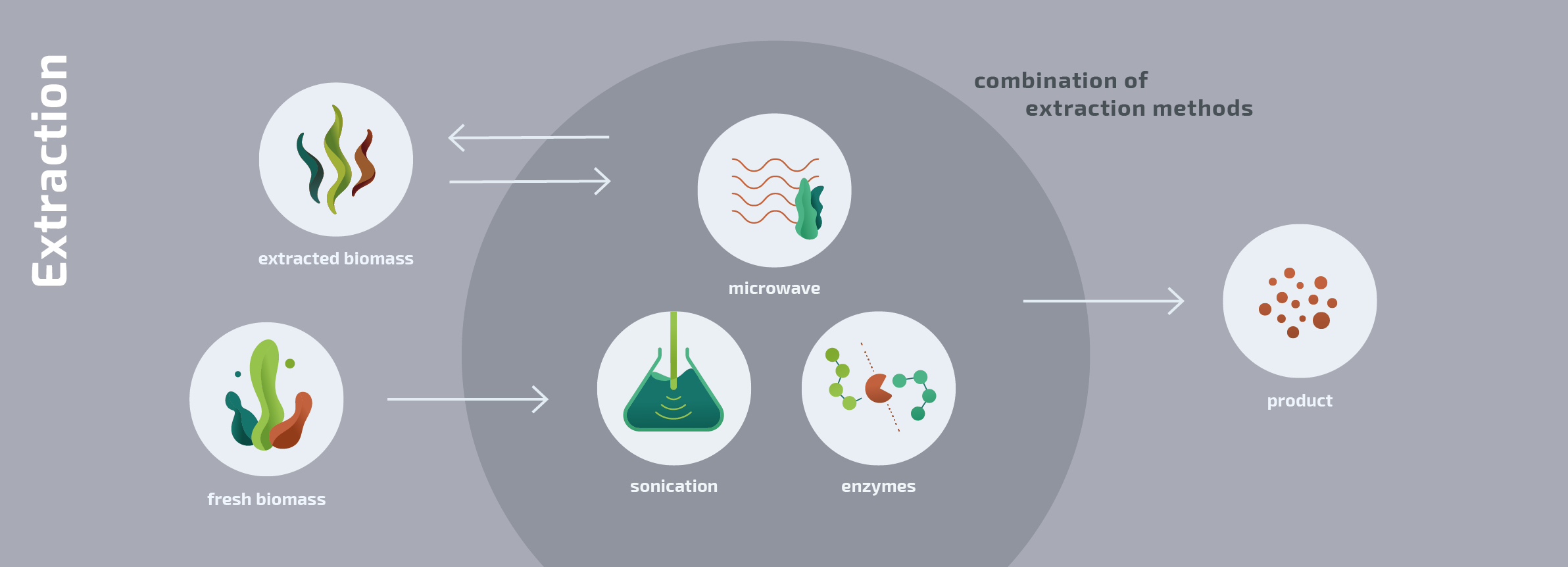Extraction and characterization of BIOactives and CARBohydrates from seaweeds and seagrasses FOR FOOD-related applications
Introduction / Background
Carbohydrates are the most important source of food energy in the world being also key ingredients for food formulations, serving as thickeners, stabilizers and gelling agents or providing functional attributes. Functional and technological properties of polysaccharides depend on composition, structure and physicochemical characteristics, defined by source and extraction method employed.
Seaweeds and seagrasses are a valuable and under-exploited source of carbohydrates, in particular, cell wall polysaccharides (phycocolloids), and bioactive compounds such as polyphenols or carotenoids. Current industrial procedures used by European companies for carbohydrate extraction from seaweeds are highly inefficient to process time, water and energy requirements. The remaining biomass (generally much more than 50% of the initial material) is used as compost or simply disposed of as organic waste.

Aim
The ERA-NET SusFood2 project BIOCARB-4-FOOD aims, in close collaboration with industry, at novel, environmentally friendly and efficient extraction techniques (ultrasound, microwave, enzymes and their combinations), combined with the exploitation of the remaining biomass, rich in bioactive compounds, to sequentially obtain novel carbohydrate-based extracts and fibers (nanocellulose) from seaweeds and seagrasses. Characterization of structure, technological properties, toxicity and bioactivity of the fractions and a life cycle assessment (LCA) will also be conducted for proving the sustainability of the procedures.
Expected results
The ERA-NET SusFood2 project BIOCARB-4-FOOD project expected to contribute to improved process efficiency, development of ingredients with high added value from already commercialized seaweed species and from under-exploited sources (seagrasses) which can positively impact in the competitiveness of seaweed, food and non-food companies at EU scale by a better valorization of raw materials and extracted remnants.
Keywords
Carbohydrates, bioactives, algae, novel extraction processes, valorization

Project consortium
Coordinated by
Dr. Amparo López-Rubio - Institute of Agrochemistry and Food Technology (IATA-CSIC) SPAIN
Partners
- NORWAY: Nofima AS
- IRELAND: Teagasc
- GERMANY: University of Hohenheim
- SWEDEN: RISE Research Institutes of Sweden
Runtime project
The BIOCARB-4-FOOD project started on 01/09/2018 and runs until 31/08/2021.
Follow the project
More information
- BIOCARB4FOOD poster
- BIOCARB4FOOD Leaflet
- Project Mid-term seminar presentation
- Project Mid-term seminar poster
Research articles
- All publications
- Clean and Green, March 2021
- Emerging extraction techniques: Microwave-assisted extraction, March 2021
- Confocal Raman imaging as a useful tool to understand the internal microstructure of multicomponent aerogels, March 2021
- Revalorization of cellulosic wastes from Posidonia oceanic and Arundo donax as catalytic materials based on affinity immobilization of an engineered B-galactosidase, March 2021
- Advanced structural characterisation of agar-based hydrogels: Rheological and small angle scattering studies, March 2021
- Improved performance of less purified cellulosic films obtained from agar waste biomass, March 2021
- PLA coating improves the performance of renewable adsorbent pads on cellulosic aerogels from aquatic waste biomass, March 2021
- Review article: Innovative processing strategies and technologies to obtain hydrocolloids from macroalgae for food applications, August 2020
- PLA coating improves the performance of renewable adsorbent pads based on cellulosic aerogels from aquatic waste biomass, 2020
- Confocal Raman imaging as a useful tool to understand the internal microstructure of multicompetent aerogels, June 2020 Benito-Gonzalez et al. (2020). Journal of Raman Spectroscopy, 51, 2022-2035
- Active properties of edible marine polysaccharide-based coatings containing Larrea nitida polyphenols enriched extract, May 2020. Moreno et al., (2020). Food Hydrocolloids, 102, 105595
- Cost-efficient bio-based food packaging films from unpurified agar-based extracts, January 2020
- Production of unpurified agar-based extracts from red seaweed gelidium sesquipedale by means of simplified extraction protocols, January 2020
- High performance starch bio-composites with celullose from waste biomass film properties and retrogradation behaviour, January 2020
- In depth characterization of bioactive extracts from posidonia oceanica waste biomass, January 2020
- Cellulose nanocrystal based films produced by more sustainable extraction protocols from posidonia oceanica waste bioma, January 2020
- Potential of lignocellulosic fractions from posidonia oceanica to improve barrier and mechanical properties of bio based packaging materials, December 2018
- Unpurified gelidium extracted carbohydrate rich fractions improve probiotic protection during storage, December 2018